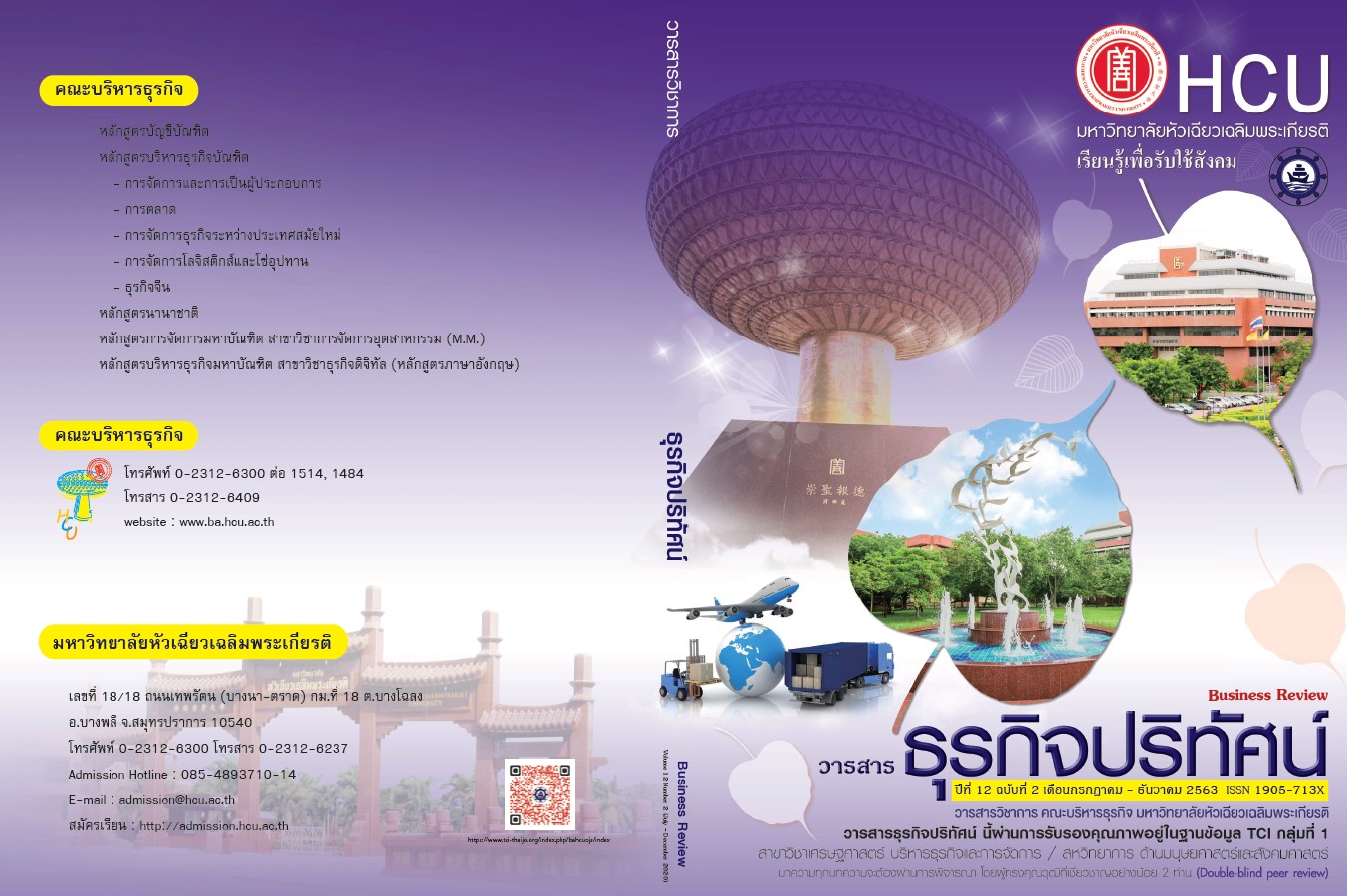The Effect of Team Affective Tone on Team Efficiency
Keywords:
Team Affective Tone, Team Trust, Team Creativity Team EfficiencyAbstract
The purpose of this research was to study the relationship between the relevant impact factors teamwork efficiency using of private companies employees in Bangkok.The sample 400 people. Data was collected by accidental sampling through questionnaires. The statistical analysis methods are percentage, mean, standard deviation, one-way ANOVA analysis of variance, inferential statistics, linear regression analysis were applied as statistical analysis tools.
Team trust is the most important independent variable that affecting the team efficiency. Therefore, internal management is important. The managers and human resource department should have created harmonious team relationships. This will enable employees to work as a team more efficiently. Sharing skills and ideas in work will create a strong team. Continued to the result is that the team will create great creativity as well. These will have a positive team affective tone that will make the team happy at work and deliver excellent effectiveness.Negative team affective tone even though it is an emotion that is inherent internal person but not related to factors Because a person has emotional quotient to regulate negative emotions and known to be used in work and adapt to society.
References
เชิงชาย ทิพย์วีรกุล. (2554). ภาวะผู้นำการเปลี่ยนแปลง ความไว้วางใจในทีมและข้อผูกพันทางใจในทีมที่ส่งผลต่อประสิทธิภาพของพนักงาน (กรณีศึกษาบริษัทรับเหมาก่อสร้างสัญชาติญี่ปุ่น). ปริญญานิพนธ์บริหารธุรกิจมหาบัณฑิต, วิทยาลัยพาณิชยศาสตร์ มหาวิทยาลัยบูรพา.
ดนัย ปัตตพงศ์. (2559). ประสิทธิภาพ(Efficiency)และประสิทธิผล(Effectiveness). สืบค้นเมื่อ 6 สิงหาคม 2563, จาก เอกสารวิชาการด้านศาสตร์การบริหารธุรกิจ เว็บไซต์: http://it.nation.ac.th/faculty/ danai/download/mbamadeeasy33.pdf
เทพ สงวนกิตติพันธุ์. (2553). ลดปัญหา ถ้าลดอารมณ์. สืบค้นเมื่อ 15 เมษายน 2563, จาก ศูนย์วิทยพัฒนา มสธ. อุดรธานี เว็บไซต์: https://www.stou.ac.th/offices/rdec/udon/main/socities5_6_ 53.html
ธาดา ราชกิจ. (2562).สร้างทีมงาน (Team Work) ให้มีศักยภาพเพื่อการทำงานระบบทีม (Teamwork) ที่มีประสิทธิภาพ. สืบค้นเมื่อ 20 เมษายน 2563, จาก HRNOTE สนับสนุนการเติบโตขององค์กรโดย HR. เว็บไซต์: https://th.hrnote.asia/orgdevelopment/190509-team-work/
ธัญญามาสโลจนานนท์. (2557). ภาวะผู้นำและแรงจูงใจในการทำงานทีส่งผลต่อความคิดสร้างสรรค์ของพนักงาน กรณีศึกษา บริษัท ซิลลิค ฟาร์มา จำกัด. ปริญญานิพนธ์บริหารธุรกิจมหาบัณฑิต, มหาวิทยาลัยศิลปากร.
นพพล นพรัตน์. (2563). การสร้างความไว้วางใจ (Trust). สืบค้นเมื่อ 15 เมษายน 2563, จาก Blog Noppol.net เว็บไซต์: https://www.noppol.net/uncategorized/การสร้างความไว้วางใจ-trust/
พนิตภัทร ปิยะภาณีพงษ์. (2560). ความคิดสร้างสรรค์ การเรียนรู้ และการทำงานเป็นทีม ที่ส่งผลต่อบรรยากาศในการทำงานของพนักงานในกลุ่มบริษัทโมโน จำกัด. ปริญญานิพนธ์บริหารธุรกิจมหาบัณฑิต, มหาวิทยาลัยกรุงเทพ.
รุ่งรัชดา พิธรรมานุวัตร. (2555). ความสัมพันธ์ระหว่างแรงจูงใจในการปฏิบัติงานกับการทำงานเป็นทีมที่มีประสิทธิภาพของพนักงานและเจ้าหน้าที่ สำนักงานหลักประกันสุขภาพแห่งชาติเขต 13 กรุงเทพมหานคร.ปริญญานิพนธ์ศิลปศาสตรมหาบัณฑิต, มหาวิทยาลัยศิลปากร.
สิทธิชัย ลายเสมา. (2557). การจัดการความรู้การพัฒนาการเรียนการสอนและการวิจัยเชิงสร้างสรรค์. สืบค้นเมื่อ 20 เมษายน 2563, จาก การจัดการเรียนการสอนเชิงสร้างสรรค์ เว็บไซต์: https://site.google .com/site/edtechsukm/kar-cadkar-reiyn-kar-sxn-cheing- srangsrrkh/khwamkhidsrangsrrkhkabka rreiynru
สุพาดา สิริกุตตา, ไพบูลย์ อาชารุ่งโรจน์ และวรินทรา ศิริสุทธิกุล. (2559). ปัจจัยสู่ความสำเร็จต่อประสิทธิภาพการทำงาน ของศูนย์รีไซเคิลพบสุข จังหวัดนนทบุรี. วารสารสังคมศาสตร์ มหาวิทยาลัยศรีนครินทรวิโรฒ,19, 310-321.
Barczak, G., Lassk, F., & Mulki, J. (2010). Antecedents of Team Creativity: An Examination of Team Emotional Intelligence, Team Trust and Collaborative Culture.Creativity and Innovation Management, 19(4), 332-345.
Dreu, C. K. W. D., Baas, M.,& Nijstad, B. A. (2008). Hedonic Tone and Activation Level in the Mood–Creativity Link: Toward a Dual Pathway to Creativity Model. Journal of Personality and Social Psychology,94(5), 739-756.
Watson, D., Clark, L. A.,& Tellegen, A. (1988). Development and validation of brief measures of positive and negative affect: The PANAS Scales. Journal of Personality and Social Psychology, 54(6),1063-1070.
Weiss, H. M., & Cropanzano, R. (1996). Affective events theory: A theoretical discussion of the structure, causes, and consequences of affective experiences at work. Research in Organizational Behavior, 18, 1-74.
Downloads
Published
How to Cite
Issue
Section
License
All articles published in the Business Administration and Management Journal Review are copyrighted by the journal.
The views and opinions expressed in each article are solely those of the individual authors and do not represent those of Huachiew Chalermprakiet University or any other faculty members. Each author is fully responsible for the content of their own article. Any errors or issues found are the sole responsibility of the respective author.




